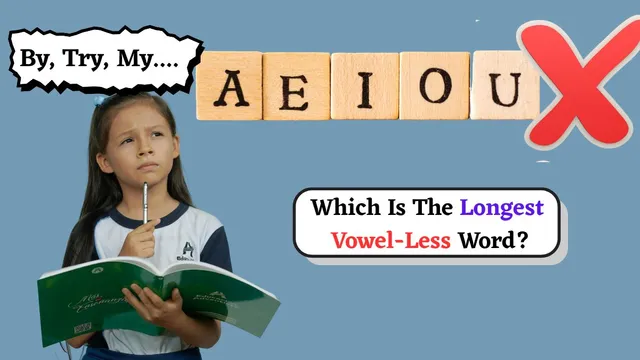- By Aditi Priya Singh
- Tue, 12 Aug 2025 04:39 PM (IST)
- Source:JND
Longest English Word Without Vowels: There are many surprises in the English language. It never fails to captivate language enthusiasts, whether they are looking for long, tongue-twisting words or tiny two-letter ones. While some words are remembered for their unusual spellings, others are admired for their lovely meanings. Some then question our perception of what a "word" ought to look like. Vowels A, E, I, O, and U are frequently thought of as being necessary for the formation of English words.
As we learn in school, vowels are necessary for the clear and proper pronunciation of the majority of words. However, there are exceptions to language, just like in life. Some words make perfect sense even when they completely omit vowels. They may merely rely on consonants to convey their meaning, or they may substitute the letter "Y" for another sound. And one of these unique words sticks out for being incredibly long. It's a record-holder not because it's the most difficult to pronounce but rather because it deviates from the spelling conventions we're accustomed to.
The Longest English Word Without Any Vowels
-1754996826699.jpg) English word without Vowels (Image: Canva)
English word without Vowels (Image: Canva)
The title belongs to the Guinness World Record holder, Twyndyllyngs, which has 12 letters. This word is the longest in the English language that does not contain any of the five main vowels: A, E, I, O, U. An 11-letter word with this feature is the singular form, twyndyllyng. It uses "Y" as a semi-vowel to form its sound.
"Twyndyllyngs" is a 12-letter Welsh word that means "twins." Although it was once part of the English language, it is no longer in use according to Collins Dictionary.
Following it, the word "Rhythms" is often cited as the longest everyday word without traditional vowels. Rhythm means a pattern of beats or movements.
ALSO READ: 50+ Kitchen Tools Quiz Questions For Children and Adults Both
How It Works Without Vowels
In English, Y often replaces vowels in some words. The "Y" in "Twyndyllyngs" acts like a vowel to make the word pronounceable. Consonant clusters help keep the word intact without standard vowels.
20 Commonly Used Vowel-Less Words
Here are the 20 most commonly used vowel-less words in daily life. While these are shorter, they follow the same no-vowel rule, relying on Y for pronunciation.
1. By – near or beside
2. Cry – shed tears
3. Dry – without moisture
4. Fly – to move through the air
5. Gym – a place for exercise
6. Hymn – religious song
7. Lynx – a wild cat species
8. Myth – traditional story
9. Rhythm – pattern of beats or movements
10. Shy – timid or reserved
11. Sky – the heavens or air above
12. Spy – a secret agent
13. Sty – pig’s pen or eye infection
14. Sync – synchronisation
15. Try - to make an attempt
16. Crypt – underground burial chamber
17. Gypsy – a member of a nomadic group
18. Ply – to work steadily at
19. Thy – Old English for “your”
20. Spryly – lively and active
ALSO READ: 30+ Fun “Guess the Fruit” Quiz Games For Toddlers To Boost Brain Power
10 Fun Facts About Vowel-Less Words
1. Y as a hero – In most vowel-less words, Y plays the role of a vowel, helping the word sound complete.
2. They’re not rare – Words without A, E, I, O, U are more common than you think, especially in everyday speech, like by, my, try and cry.
3. Longest common one – Rhythms is often cited as the longest everyday word without traditional vowels.
4. Old English roots – Many vowel-less words come from Old English, where Y was used as a vowel.
5. Secret code vibe – They often look like text shorthand or spy code, making them fun for puzzles.
6. Scrabble gold – Words like crypt or gym can score big in Scrabble because of high-value consonants.
7. Travel the world – Vowel-less words exist in other languages, too, like krk in Croatian.
8. Musical rhythm – The word rhythm is itself about patterns and beats, fitting its unusual look.
9. Poetic charm – Writers sometimes use vowel-less words to create unique rhymes or meter.
10. Language learners’ challenge – They can be tricky for English learners because they don’t follow normal vowel rules.

